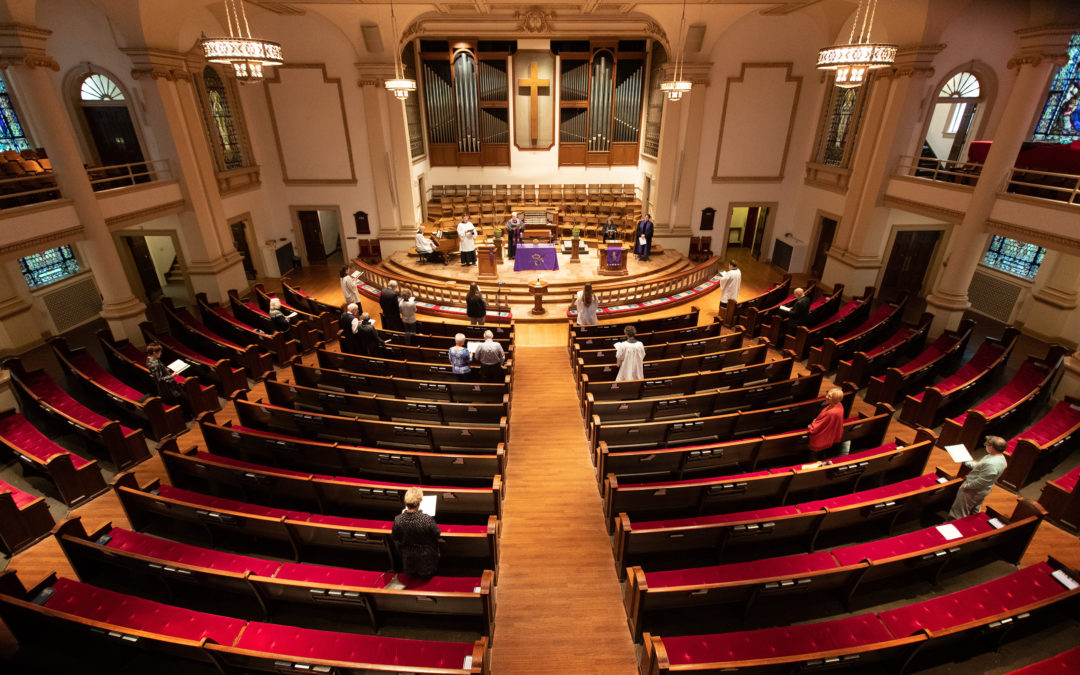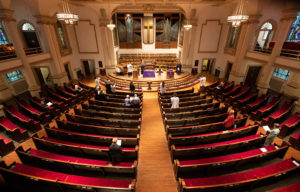
The American Rescue Plan is welcome relief for faith communities

Members and leaders of Belmont United Methodist Church in Nashville, Tenn., worship in a mostly empty sanctuary Sunday, March 15, 2020, after church leadership encouraged people to worship from home via video livestream in response to the coronavirus. Photo by Mike DuBose, UM News
(RNS) — For communities of faith, COVID-19 has introduced new stress to the already demanding pastoral work of comforting the families and friends of those who have died and ministering from afar to those who are sick. While virtual worship turns out to be possible, it is a less than ideal way to make vital community connections.
But there is another immediate and concrete way that faith communities have been called to action during the pandemic: in feeding the hungry, supporting those who have lost their jobs, income or housing and offering emotional support to families who have increasing requirements as caregivers.
While faith communities often serve as first responders to the needs of people in their communities, it is simply impossible for houses of worship or social service agencies to shore up and sustain everyone in our communities. Our faith convinces us that we have a moral imperative to care for all of those left behind in this crisis. We need the support of our government, a government that works for all the people.
When Congress passed the American Rescue Plan in March, it dramatically shifted how the United States addresses the ravages of the pandemic and the ravages of poverty. Not only was there funding to support vaccine distribution, the legislation provided structural support for people who struggle to pay their monthly bills.
Two popular tax credit programs — the Earned Income Tax Credit and the Child Tax Credit — were expanded, allowing child poverty to be cut in half this year. Imagine what it means to moms and dads who can now afford food, diapers, clothing and utility bills and know they are no longer living on the edge of the chaos that comes from never having enough money.
Recently, Sen. Sherrod Brown of Ohio joined the Rev. Eugene Cho, president and CEO of Bread for the World, and me to discuss the dramatic impact of the American Rescue Plan in helping families who struggle to pay the rent and keep their families from the edge of destitution. As Brown said of his vote on the American Rescue Plan: “The best day of my career. Look what we did. Shots in people’s arms and money in people’s pockets. Kids back in school and people back in jobs.”
The job of addressing the pandemic and poverty is far from over. These effective tax credit programs will need to be made permanent in legislation that Congress will consider later this year. It’s a step that the interreligious faith community will be there to raise its voice for.
Churches will also continue to build trust with their members to become vaccinated. The president has encouraged faith leaders to help build confidence for everyone to get vaccinated, saying, “They’re going to listen to your words, more than they are me, as president of the United States. We need you to spread the word, let people in our communities and your community know how important (it) is to get everyone vaccinated when it’s their turn. … I think this is the godly thing to do. Protect your brother and sister.”
Just as communities of faith have been called on the last 13 months to respond to serve others — with emotional, material and advocacy support — we continue to be called on to support the common good to defeat the pandemic and to defeat poverty.
( Diane Randallis the general secretary of the Friends Committee on National Legislation, a national, nonpartisan Quaker lobby for peace, justice and the environment. The views expressed in this commentary do not necessarily reflect those of Religion News Service or UrbanFaith.)
